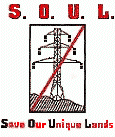            
         

|
Transmission Line = Mine Line
 BY WINONA LA DUKE
BY WINONA LA DUKE
October 2000
" We are right in the middle of that environmental slum Manitoba Hydro
has created " --Kenny Miswaggon, Chair of the Pimicikamak Cree Nation of
Cross Lake, Manitoba.
"We have reaffirmed our historic commitment to protecting the lands,
waters and people of Wisconsin, We are sending a clear message to our utilities
that we oppose the construction of power lines that will bring more harm
to the Lac Courte Oreilles Band of Lake Superior Chippewa in Hayward and
the Pimicikamak Cree Nation in Manitoba." --Tom Maulson, President of the
Great Lakes Inter-Tribal Council.
A 250-mile, 350,000-volt electric transmission line jointly proposed
by the Minnesota Power and the the private utility Public Service Corporation
of Wisconsin would bring power from hydroelectric dams in northern Manitoba
Cree communities. The line would run from Duluth across the Lac Courte
Oreilles Ojibwe reservation to Wausau, Wisconsin. A smaller ll5,000-volt
spur line would run from Rhinelander to the proposed Crandon metallic sulfide
mine site next to the Mole Lake Ojibwe Reservation in northeastern Wisconsin.
That line, and increased cooperation and mergers between utilities, has
linked Crees from northern Manitoba, with farmers, landowners and Native
nations in northern Wisconsin--in a pitched battle to preserve the Wolf
River, Mole Lake, and the stunning waterways and boreal forests thousands
of miles apart.
For almost two decades Native communities, sportfishers, and environmentalists
have together waged successful opposition to the Crandon mine, proposed
at first by Exxon and then by Rio Algom, which is being purchased by the
South African company Billiton. The copper/zinc/gold mine is projected
to produce 11 million tons of metals over a 28-year mine lifespan, and
leave behind 44 million tons of acidic wastes, becoming Wisconsin's largest-ever
toxic waste dump. Data from the mining company itself indicates that contamination
would affect the local groundwater for more than 200,000 years. The proposed
mine would use up to 20 tons a month of cyanide, as well as other chemicals
for processing the ore. The mine would also pump more up to 1400 gallons
a minute out of the mine impacting not only the immediate mine area, but
Mole Lake, the precious Ojibwe wild rice beds, and the Wolf River, one
of the most pristine rivers in the nation.
"I 'd like to see my children have everything I had, and I believe the
wild rice beds will be contaminated if the mine goes through " says Roger
McGeshick, Mole Lake Sokaogon Ojibwe Tribal Chairman, "A big corporation
has all the money, but money doesn't mean anything to people here. What's
important is their way of life. Water quality is part of their way of life
and of ensuring our way of life."
Zoltan Grossman of the Midwest Treaty Network observes, "The Crandon
proposal has already united former adversaries over treaty fishing rights
into an alliance to protect the fishery from mining companies. It has not
only brought together tribes with sportfishers, but environmentalists with
unionists, and rural residents with urban students." He adds, "Many rural
groups, tribes, and townships around Wisconsin that are opposing mining,
transmission lines, power plant proposals, and Perrier springwater pumping,
are also beginning to come together in a new statewide anti-corporate movement.
In the spirit of Wisconsin's progressive and environmental traditions,
they believe in 'people power, not corporate power'."
The transmission line itself is expensive: an estimated $200-300 million
would be spent on its construction, according to the Wisconsin state agency
Public Service Commission (PSC). The line is controversial because high-voltage
transmission lines are considered dangerous, and because it would cut a
swath through the property of over 7000 Wisconsin residents and diminish
farmlands and forests alike. An estimated 50% of the power is lost between
the point of origin and the point of use, with increasing concern about
the possible health consequences of the electromagnetic fields on human
beings, dairy cattle, and wildlife.
Northern States Power (NSP) is the single largest export contract for
power from huge dams in northern Manitoba, dams which devastate not only
the environment, but the people who live there. At present, NSP and it's
affiliates purchase l000 megawatts of power from Manitoba Hydro moved through
immense transmission lines to the south. The proposed 345 kv Arrowhead-
Weston Transmission Line, headed from Duluth to Wausau, is being opposed
by many human rights, farmers', environmental and indigenous groups--notably
the group that calls itself "SOUL"--Save Our Unique Lands.
That contract, the dams, and proposed transmission lines through northern
Minnesota and Wisconsin are ecologically and socially devastating. In the
early l970s, Manitoba Hydro put in a series of seven dams on the Nelson
and Churchill River systems in northern Manitoba. Lauded as a source of
"clean energy " from the north, Manitoba Hydro joined with neighboring
Ontario Hydro and Hydro Quebec in selling that power to the United States,
the single largest market for energy in the world. Since that time, things
have gone pretty well for Manitoba Hydro ($1 billion in gross revenues
in 1999) and Northern States Power, with banner years for profits at both
companies, and the appearance to a larger world good choices for " green
energy", even though the companies have cared little for the people and
land devastated by the projects.
Five of the twelve dams are on the Nelson River, the river which runs
through Cross Lake on its way to Hudson Bay. The first set of dams have
already destroyed 3.3 million acres of land. Rivers have been turned to
toxic reservoirs now laced with methylmercury. Fish from the Nelson River,
a staple of the Cree, have been contaminated. Pregnant women, elders and
children must severely limit their intake or risk dire health consequences
. Large tracts of boreal forest have been flooded, displacing and destroying
animal habitat. Both of these consequences have made the Cree environmental
refugees and paupers in their own lands.
The human consequences are also devastating. Unemployment has reached
an estimated 85% in Cross Lake, and with that are all the social and human
costs of the environmental destruction. Cross Lake is considered to have
among the highest suicide rates in Canada, a community of 4000 has more
than l00 residents which attempted suicide in the second half of l999 alone.
More than 50 members of the Pimicikamak Cree Nation have been killed directly
or indirectly by the megaproject, as many others drowned trying to travel
on unstable reservoir ice and water. A Canadian Treaty Court has found
Manitoba Hydro legally liable for a number of these deaths. Manitoba Hydro
has suggested "compensation" in the form of $l5,000 each for the deaths.
There is a set of simple reasoning for the logic of future development.
If new transmission lines are allowed to go through, Manitoba Hydro will
have increased access to markets, and thus the potential for more dams
in the north. That reasoning does not escape the Cree. "If you're gonna
double the exports, that means you're gonna double the misery," said Kenny
Miswaggon, tribal leader from the Pimicikamak Cree Nation of Cross Lake,
Manitoba.
With at least 75% of Manitoba hydroelectric potential is as yet "untapped",
more proposals are under consideration. Much of this power would head into
Minnesota and Wisconsin as export markets--down the high voltage transmission
lines, and to U.S. consumers. There are obvious alternatives. Northern
State Power's Buffalo Ridge wind project is a banner energy producer, with
additional potential for wind energy in the Midwest estimated to be able
to provide up to three quarters of US electrical needs. The recent Midwest
Renewable Energy Fair in Madison, drew almost 10,000 people to talk about
the potential for alternatives, and the Ojibwe, like other tribes, are
clear on the need to prioritize. The Lac Courte Oreilles Ojibwe recently
passed a resolution calling "for greatly increased investments by tribal,
local, state and national governments, as well as by individuals and corporate
and institutional entities in energy conservation and genuinely renewable
energy sources in Wisconsin and the upper Midwest, to displace the 'need'
to purchase additional environmentally and socially destructive electricity
from Manitoba Hydro."
The electricity from the Duluth-Wausau transmission line, as well as
from new proposed electrical generating plants in rural southern Wisconsin,
would not be used to provide power to state residents, but rather by used
by private utilities to sell power to Chicago and other urban markets.
The private utilities threaten to use eminent domain to condemn land for
a project that will not even benefit Wisconsin residents. Instead of approving
yet another outdated utility transmission line, the Wisconsin PSC could
be exploring alternatives that would benefit consumers.
The PSC's own studies indicate that Wisconsin could reduce energy usage
by 35% over 20 years through a variety of measures, including process improvements
in manufacturing, lighting efficiency measures in commercial sector, and
fuel switching for residential needs. Keith Reopelle, of Wisconsin's Environmental
Decade, points out that utilities have backed away from spending money
on their energy efficiency programs. "The Public Service Commission records
show that utility programs aimed at reducing household and business energy
use and bills have dropped by $94 million or 64% over the past four years.
Purchases for instance of high efficiency furnaces snared 90% of the rebate
assisted market in l993, as opposed to 20% today." There are, in short,
no absence of alternatives to destructive dam megaprojects, mines, and
dangerous transmission lines.

Winona LaDuke
(center) with Emily Saliers (wearing a sticker supporting the Town of Nashville)
and Amy Ray of the Indigo Girls, at the Honor The Earth concert in Keshena,
Menominee Nation, October 19, 2000. Credit: Christine Munson
|
About Winona LaDuke
WINONA LA DUKE was the Green Party Candidate for Vice President in 1996
and 2000, running with presidential candidate Ralph Nader. La Duke lives
on the White Earth Ojibwe (Chippewa) Reservation in Minnesota. She is a
longtime Native American rights activist who serves as the Program Director
for Honor the Earth Fund, board co-chair for the Indigenous Women's Network,
and director of the White Earth Land Recovery Project. A graduate of Harvard
and Anitoch University, LaDuke was named in 1994 by Time magazine as one
of America's 50 most promising leaders under 40 years of age. She is the
author of several books, including All
Our Relations: Native Struggles for Life and Land(1999), and has three
children.
On October 18-19, 2000, LaDuke visited Wisconsin as part of the Honor
The Earth Tour, which included Jackson Browne, the Indigo Girls, and Annie
Humphrey. The Tour drew over 2,000 people in Stevens Point. LaDuke and
the Indigo Girls then visited Crandon to support a court hearing on the
Town of Nashville case to rescind a so-called "Local Agreementfor the Crandon
mine and attended a feast on Mole Lake Reservation. Tour concluded with
Keshena memorial to Menominee activist
Ingrid
Washinawatok, who was slain last year in Colombia.
LaDuke's running Ralph Nader soon afterwards called on the South African
company Billiton to drop
the Crandon mine. The following article was written for LaDuke's visit
to Wisconsin. |

|




